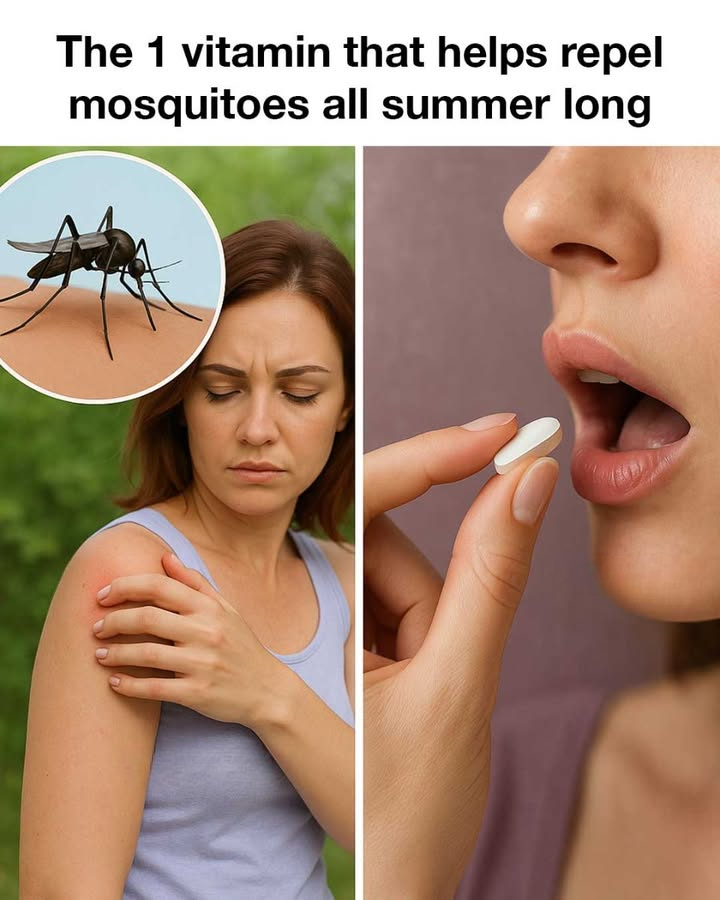“Vitamin B1 and Natural Remedies: How to Keep Mosquitoes Away Without Chemicals”
Mosquitoes are more than just pesky little insects buzzing around your head—they’re carriers of serious diseases like malaria, dengue fever, and the Zika virus. As the weather warms up and mosquito season kicks in, keeping these biting bugs at bay becomes a top priority for many people. While chemical repellents containing DEET have long been the go-to solution, more and more folks are turning toward natural alternatives that are safer for both humans and the environment. Interestingly, certain vitamins, particularly Vitamin B1, have caught the spotlight for their potential to make you less attractive to mosquitoes. But how true is this claim, and what other natural remedies actually work?

The Connection Between Vitamins and Mosquito Repellency
Vitamins are essential for maintaining good health, from boosting immunity to supporting energy production. But some studies and anecdotal evidence suggest that certain vitamins might do more than keep you healthy—they could help make you less appealing to mosquitoes. The theory is that these vitamins can alter the chemical makeup of your sweat or skin odor, which in turn makes you harder for mosquitoes to detect or less enticing to bite. While this idea sounds promising, let’s dig deeper into the most talked-about vitamin in this category: Vitamin B1.
Vitamin B1 (Thiamine) – Nature’s Possible Mosquito Shield
Vitamin B1, or thiamine, is a water-soluble vitamin crucial for energy metabolism and proper nerve function. You can find it in foods like whole grains, pork, nuts, seeds, and legumes. Beyond its essential health benefits, some believe that Vitamin B1 works as a natural mosquito repellent. The claim is that when you consume enough thiamine, your body produces a skin odor that mosquitoes dislike, essentially making you an unattractive target. Humans can’t detect this change in scent, but mosquitoes supposedly can—and they steer clear. To try this approach, you can load up on Vitamin B1-rich foods or take supplements, though it’s always smart to consult a doctor before starting any new vitamin routine. While there are plenty of personal testimonies backing up Vitamin B1’s mosquito-repelling abilities, scientific studies on the topic are limited and results remain inconclusive. More research is needed to know exactly how well it works and what dosage would be effective for bite prevention.
Other Natural Mosquito Repellents That Actually Work
If you’re looking for non-chemical ways to protect yourself, nature has no shortage of remedies that can help keep mosquitoes away. Many of these are plant-based solutions that have been used for generations and are even backed by modern research.
-
Lemon Eucalyptus Oil: One of the most effective natural repellents, thanks to a compound called PMD, which offers protection comparable to low-concentration DEET.
-
Lavender Oil: Known for its calming aroma, lavender oil doubles as a mosquito deterrent with its strong scent.
-
Cinnamon Oil: A sweet-smelling solution that can kill mosquito larvae and discourage bites from adult mosquitoes.
-
Thyme Oil: Burning thyme leaves or applying diluted thyme oil can provide significant mosquito protection for up to 90 minutes.
-
Greek Catnip Oil: Studies suggest it can be even more effective than DEET, thanks to its potent compound nepetalactone.
-
Soybean Oil: A safe, long-lasting, skin-friendly alternative that’s often used in natural commercial repellents.
-
Citronella Oil: A classic favorite, citronella works by masking the scents that normally attract mosquitoes to you.
-
Tea Tree Oil: Besides being an antiseptic for treating bites, its strong smell also wards off mosquitoes.
-
Geraniol: Derived from plants like geraniums, this floral-scented oil has proven mosquito-repelling properties.
-
Neem Oil: A traditional remedy used for centuries, neem oil’s compounds are toxic to mosquitoes, making it a reliable natural defense.
Finding What Works Best for You
Natural mosquito repellents offer a variety of options, from boosting Vitamin B1 intake to using essential oils. Each person’s body chemistry is different, meaning what works for one individual might not work as well for another. If you want to try Vitamin B1, focus on a healthy diet with foods rich in thiamine or consult your doctor about supplements. For topical solutions, essential oils like lemon eucalyptus or citronella can provide excellent protection without harsh chemicals. As with any natural remedy, always do a patch test before applying oils directly to your skin to avoid irritation. And while natural repellents can be effective, they may not always provide the same long-lasting protection as chemical products, so be prepared to reapply as needed, especially in high-risk areas.
The bottom line is that while Vitamin B1 shows potential as a natural mosquito deterrent, the scientific evidence isn’t strong enough to rely on it alone. Combining dietary support with tried-and-true natural repellents can give you the best chance of enjoying mosquito-free outdoor time this summer. Protecting yourself doesn’t have to mean dousing your skin in chemicals—nature has plenty of tools to help you fight back.





